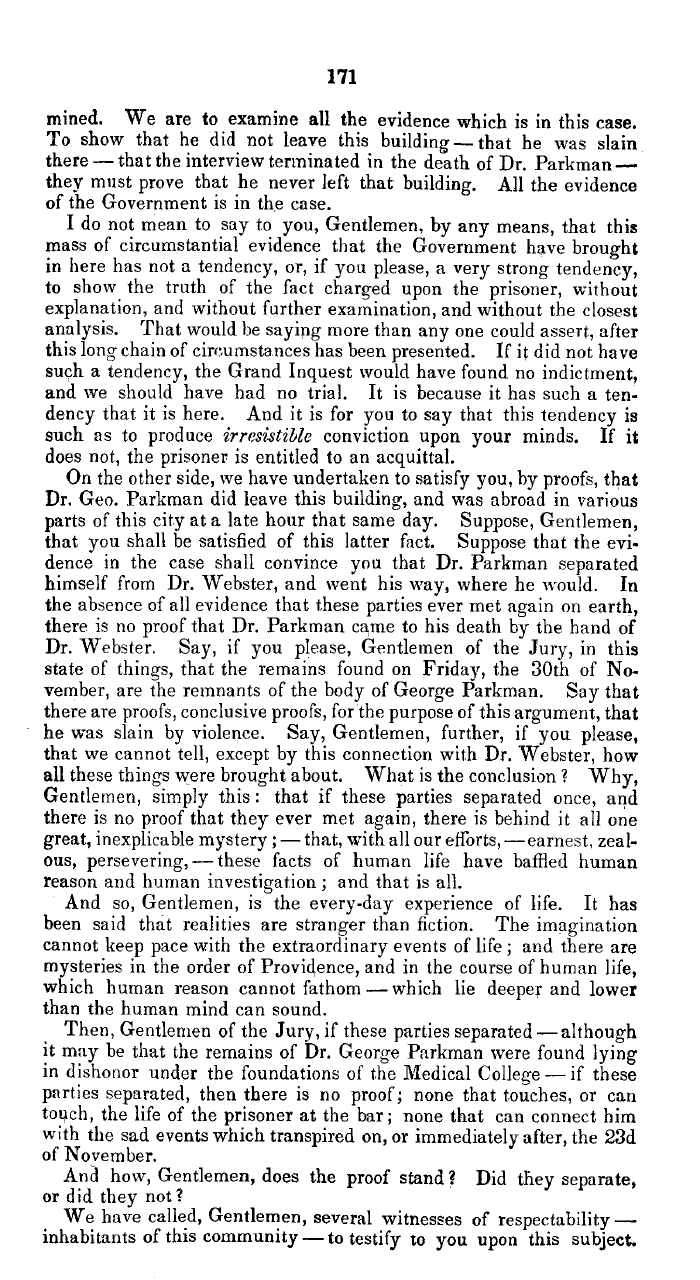|
171
mined. We are to examine all the evidence which is in this case.
To show that he did not leave this building-that he was slain
there-that the interview terminated in the death of Dr. Parkman-
thev must prove that he never left that building. All the evidence
of the Government is in the case.
I do not mean to say to you, Gentlemen, by any means, that this
mass of circumstantial evidence that the Government have brought
in here has not a tendency, or, if you please, a very strong tendency,
to show the truth of the fact charged upon the prisoner, without
explanation, and without further examination, and without the closest
analysis. That would be saying more than any one could assert, after
this long chain of circumstances has been presented. If it did not have
such a tendency, the Grand Inquest would have found no indictment,
and we should have had no trial. It is because it has such a ten-
dency that it is here. And it is for you to say that this tendency is
such as to produce irresistible conviction upon your minds. If it
does not, the prisoner is entitled to an acquittal.
On the other side, we have undertaken to satisfy you, by proofs, that
Dr. Geo. Parkman did leave this building, and was abroad in various
parts of this city at a late hour that same day. Suppose, Gentlemen,
that you shall be satisfied of this latter fact. Suppose that the evi-
dence in the case shall convince you that Dr. Parkman separated
himself from Dr. Webster, and went his way, where he would. In
the absence of all evidence that these parties ever met again on earth,
there is no proof that Dr. Parkman came to his death by the hand of
Dr. Webster. Say, if you please, Gentlemen of the Jury, in this
state of things, that the remains found on Friday, the 30th of No-
vember, are the remnants of the body of George Parkman. Say that
there are proofs, conclusive proofs, for the purpose of this argument, that
he was slain by violence. Say, Gentlemen, further, if you please,
that we cannot tell, except by this connection with Dr. Webster, how
all these things were brought about. What is the conclusion? Why,
Gentlemen, simply this: that if these parties separated once, and
there is no proof that they ever met again, there is behind it all one
great, inexplicable mystery; -that, with all our efforts,-earnest, zeal-
ous, persevering,-these facts of human life have baffled human
reason and human investigation ; and that is all.
And so, Gentlemen, is the every-day experience of life. It has
been said that realities are stranger than fiction. The imagination
cannot keep pace with the extraordinary events of life ; and there are
mysteries in the order of Providence, and in the course of human life,
which human reason cannot fathom-which lie deeper and lower
than the human mind can sound.
Then Gentlemen of the Jury, if these parties separated-although
it may be that the remains of Dr. George Parkman were found lying
in dishonor under the foundations of the Medical College-if these
parties separated, then there is no proof; none that touches, or can
touch, the life of the prisoner at the bar; none that can connect him
with the sad events which transpired on, or immediately after, the 23d
of November.
And how, Gentlemen, does the proof stand? Did they separate,
or did they not?
We have called, Gentlemen, several witnesses of respectability-
inhabitants of this community-to testify to you upon this subject.
|

